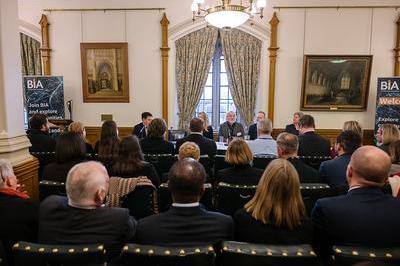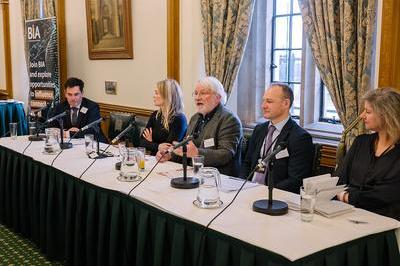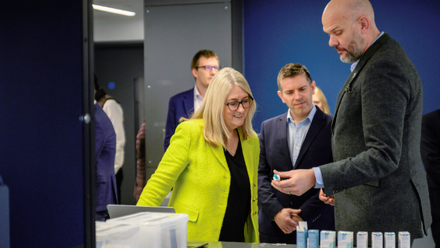CEO Update - 26 February 2024
Rare Disease Day 2024
This Thursday marks Rare Disease Day, and as it is a leap year it is taking place on the rarest day of all – 29 February. There are 3.5 million people in the UK living with a rare condition and one in 17 people will be affected by a rare condition at some point in their lives.
For Rare Disease Day 2024, Genetic Alliance is highlighting that although rare conditions are individually rare, they are collectively common. They will be sharing the statistics that surround living with a rare condition and telling the stories of the people behind them.
Many BIA member companies work in the rare disease space and we must keep this high on the policy agenda. It was great to see a packed room for a discussion about where next for the rare disease policy that we hosted last week.
Take a look at our recent report, with research provided by global consultancy firm PwC, that offers a comprehensive assessment of the progress that has been made in improving access to rare disease treatments in the UK, and the challenges that remain. The report is based on extensive research and conversations with key stakeholders in the UK rare disease space, including NHS England, NICE, patient groups, clinicians, and industry.
WTO Ministerial meeting: focus on IP and pandemic preparedness
Important new briefing notes have been published by the World Trade Organisation ahead of the key Ministerial meeting (MC13) taking place in Abu Dhabi this week. These technical notes show that the TRIPS Council has reached consensus on two key Intellectual Property (IP) issues (for the specialists para 8 and future pandemic preparedness). This means there is unlikely to be a significant change to the TRIPS waiver agreed this week.
We at the BIA have been steadfast in making the case for not coming up with the wrong solution to the wrong problem for pandemic preparedness. There still needs to be much global work along the lines of the 100-day mission, at least it seems that some of the more glib proposals that would have impacted the ability for the private sector to invest in countermeasures between pandemics are now off the table. I was able to express our thanks for the work on this to the Rt Hon Greg Hands, Minister for Trade Policy last week. The UK government, and its officials, have been consistent and steadfast on these complex briefs for many years, at a time when expected US global leadership has not been present, and this is something our sector should rightly be appreciative of.
Animals in research discussed in Westminster
I sometimes think the best discussions about Westminster make little impact on the national news but show that we do have a mechanism where issues of concern can be properly raised and properly debated. A good example of this is the recent discussion in the Westminster Hall of e-petitions related to animals in research.
Public concern through signing an e-petition reached the 100,000 threshold needed to trigger a Westminster Hall debate on this matter and it was good to see a full debate and the government response to this concern. The debate considered two e-petitions: 1) End the use of animals for toxicity tests and prioritise non-animal methods (NAMs), and 2) Ban the use of dogs for testing and research purposes in the UK. The first of these reached the 100,000 signatures required to be considered for a debate after receiving a boost from celebrities on social media. The second had just 30,000 signatures but was included apparently because singer Will Young tabled it.
Westminster Hall debates do not automatically lead to policy change, and this debate was full of wildly inaccurate claims but did yield several very positive outcomes including:
The funding of the NC3Rs will immediately double to £20 million in 2024-25; Government to publish a plan this summer to accelerate the development, validation and uptake of technologies and methods to reduce reliance on the use of animals in science; and the Ipsos MORI survey on public attitudes to animals in science to restart. Other initiatives announced include a hike in fees for licences and a review of five-year licences with a view to making them three years in duration.
Andrew Griffith MP, Minister for Science, Research and Innovation, and Chi Onwurah, Labour Shadow Minister for Science, Research and Innovation, both acknowledged that the UK is not yet in a position to move beyond the use of animals in science. To their credit, both acknowledged the complexity of the task as well as the opportunities that would be afforded by new technologies. The Minister also emphasised the importance of research to protect animals and the environment, an important point given that the scope of regulatory animal testing includes known, emerging and yet-to-be-revealed impacts of human activity. I want to pay tribute to Understanding Animal Research who briefed parliamentarians on the facts and provided up-to-date technical information to the civil service and others. Chris MacGee’s comment piece is well worth a read.
Sir John Bell to step down as Regius Professor at Oxford, joins Ellison Institute of Technology
Last week is the end of an era as the University of Oxford has announced that Professor Sir John Bell will step down from his role as Regius Professor of Medicine on 31 March, to take up the new position of President of Ellison Institute of Technology (EIT) Oxford. He will also become Co-CEO of EIT Global.
Professor Sir John Bell’s connection with Oxford stretches back 50 years when he arrived from Canada as a Rhodes Scholar at Magdalen College. I have had the privilege to work with him over many years in his role as UK life science champion and know the difference his leadership has made. Sir John will lead multi-disciplinary teams at EIT Oxford – a major new interdisciplinary research and development facility that will support EIT’s mission to develop and deploy technology in pursuit of solving humanity’s most challenging and enduring problems.









